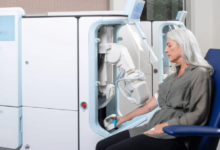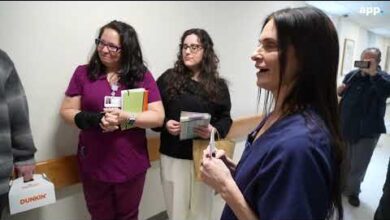‘Life-like’ nurse simulation training boosting student engagement

A cutting-edge training facility is successfully using the latest simulation technology, including virtual reality and artificial intelligence (AI), to train nurses of the future in Wales, according to educators.
Senior nursing staff have said the facility’s first year of use has been a huge success in increasing confidence in its current students, and interest from prospective ones.
The Swansea University Simulation and Immersive Learning Centre (SUSIM) hosted its first students in September 2023, with nursing, paramedic, surgical and other healthcare personnel now being trained.
“The tech has come in… to add the fidelity and immersion”
Jo Davies
It features virtual reality, AI, interactive simulation technology and the largest “immersive wall” suites in the UK, allowing students to experience a variety of “life-like” settings – as one student described them.
These range from a busy high street to a flat, hospital environment or specialised operating room.
Reflecting on the first academic year of the centre being open, head of simulation and associate professor Jo Davies said it has already had an impact on the competence and confidence of the students, and was becoming a driver for students to take up nursing,
“The immersion and the fidelity allows learning to be transferred through into practice,” she said. “There is evidence that it allows [students] to have confidence and competence in practice where they didn’t before.
“Because we create really psychologically safe environments, it’s fine to make a mistake and our students are enjoying simulation,” she said.
Ms Davies explained that SUSIM’s suites were designed to be as flexible as possible to give students on all of its healthcare courses experience in all sorts of settings.
Both wearable and mounted technologies are deployed to make them as realistic and immersive as possible, she noted.
In addition, Ms Davies said the immersive wall technology can either be used as a static image or environment or made to be dynamic, in order to further immerse students in a scenario which feels real.

Simulation training at SUSIM, Swansea
Simulation scenarios in these rooms – like a traditional simulation learning site – cover adult, children’s, mental health and learning disabilities nursing, and are also now being used to simulate multidisciplinary working alongside other fields such as medics.
As well as the adaptable rooms, SUSIM has two bespoke immersion rooms – one is a home environment frequently used to train community and learning disability nurses and another is an operating room in which the centre can deploy actors, volunteers and a huge range of lifelike manikins.
With the success of the centre so far, Ms Davies said the development of SUSIM’s immersion facilities will continue as more use cases for technology like VR and AI are found.
“We’re on a crossbar with AI,” she said, explaining that the centre has started to “tinker” with the emergent technology to improve its VR simulation and create more realistic and responsive scenarios.
As well as this experimentation, she said AI has begun to be used successfully in improving the centre’s Welsh language offerings.
She said: “A tricky factor is communication – how do we get [virtual] avatars to speak back to [students]?
“Once we pass that technical curve, and there are genuinely immersive techs, I wonder what we can do,” she added.
Ms Davies said that, while the technology is impressive, her team has been careful to not get carried away.
She said: “We drive the centre by high standards of education and pedagogy. We want to make sure the quality of the education is of a high standard, and the tech enhances that.
“We don’t drive the programmes through the tech, we use a methodical approach where we have tools and templates for the design of the curriculum,” she said. “Where the tech has come in is to add the fidelity and immersion.”
She said the centre had helped “bring the joy” back into nurse training and she hoped it would aid in overcoming the challenge of low nursing course uptake, and high attrition, with the Universities and Colleges Admissions Service (UCAS) having reported yet another decrease in nursing student numbers for the 2023-24 year.
“The centre is not only an invaluable asset to our existing learners, but it is also proving to be a major attraction for prospective students,” Ms Davies continued.
“Open days have included tours of our facilities supported by our experienced simulation team, and the feedback we’ve received has highlighted how students are positively influenced by the incredible learning opportunities they will experience at Swansea.
“We want to encourage people to come into the profession, and stay in the profession, and because they’re having those experiences – that’s really important; recruitment and retention in undergraduate programmes is a real challenge.”

Simulation training at SUSIM, Swansea
Senior nursing lecturer and simulation education specialist Deborah Rowberry, who has helped develop the site and teaches in it, spoke about the value of improving simulation teaching.
She said: “Ultimately, the overall aim of the impact is patient safety, improving it and improving that level of practitioner at the end of the programme.
“The biggest impact of it has been immersing students in a realistic environment and we are finding that students are really enjoying it, learning and asking for more.”
Ms Rowberry said there has been examples of “gamification” of learning, enabled by the interactive technology, which students can work through.
Feedback from the students, according to the two nurses, has been overwhelmingly positive so far.
Nursing student Chloe Woodbridge said the life-like environments that the centre allowed for improved her confidence ahead of making the leap from trainee to registered nurse.
Rosie Read, a children’s nursing student, added: “It allows you to immerse yourself in a realistic environment while still being in a safe space to learn.
“Also, we can develop new skills and interact with members from other disciplines, which is great preparation for placement and qualified practice.”
According to the university, SUSIM has also begun to be used by Welsh health boards for continued professional development and workforce training, as well as by external agencies that can adapt the suites to their specifications.







